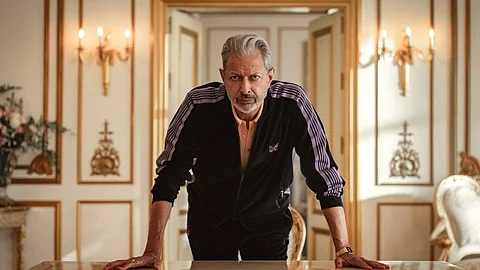Kaos Series Review: Jeff Goldblum shines in this exceptionally deep, contemporary retelling of Greek mythology
Kaos(3.5 / 5)
Charlie Covell’s modern take on Greek mythology is as grand in its conception as it is in scale, leaving the viewer awestruck by the sheer number of themes at play. Absurdly comical and thought-provoking in the same breath, Kaos has a frenzied way of switching things up to present an accurate allegory of the real world as we know it. Delving into subjects as far-reaching as absolute power and its resultant corruption, the nature of oppression, the purpose of life and the notion of a better one after death, inordinate faith placed in the hands of the Gods, over-reliance on prophecy, and the complicated role of family, it is one of those brilliant shows that is impossible to categorise. Creator Charlie Covell and Georgia Christou cannot be lauded enough for the writing - from which stems an array of fine performances, beginning with Jeff Goldblum. The many characters central to the story (and there are many) have the power to pull you in individually, and keep you invested in their trials and tribulations. It’s not common to be interested in the whole lot, usually, but you are. Kaos succeeds in connecting all these varied Gods and humans in a cohesive and meaningful manner to present an ingenious mythological retelling set to a contemporary parallel world.
Directors - Georgi Banks-Davies, Runyararo Mapfumo
Cast - Jeff Goldblum, Janet McTeer, Stephen Dillane, Aurora Perrineau, Cliff Curtis, Nabhaan Rizwan, Killian Scott, Misia Butler, David Thewlis, Leila Farzad
Streaming On - Netflix
High up on Mount Olympus, Zeus (Jeff Goldblum), King of the Gods, is beside himself with anxiety and rage. He is fearful of his infinite power being snatched away owing to a prophecy. Down on earth, in ‘Krete’, on the Day of Olympia, a monument dedicated to his existence is desecrated, angering him no end. Petty, highhanded and extremely consumed by himself, Zeus is the quintessential tyrant. His awful actions and behaviour are sometimes masked by humour to lighten the mood. Hera (Janet McTeer), Zeus’ sister-wife, plots and schemes, while attempting to humour him. Frivolous young Dionysus (Nabhaan Rizwan), the God of pleasure and madness, happens to be Zeus’ only child who visits him. Back in Krete, the former conjures ways to impress his father and be taken more seriously. Among the mortals, Riddy / Eurydice (Aurora Perrineau) is married to rockstar musician, Orpheus (Killian Scott), whom she has fallen out of love with. President Minos (Stanley Townsend) is in the thick of apprehending the protestors who defiled the monument, with his suspicions firmly on members of the Trojan community. A mere puppet of Zeus and the Gods, Minos is simply there to carry out orders. His daughter Ari / Ariadne (Leila Farzad), a staunch supporter of her father, is supposed to have accidentally caused the death of her brother, Glaucus, when they were infants. In the deathly realm, Zeus’ brother Hades (David Thewlis) and his wife, Persephone (Rakie Ayola), deal with the pressure of managing and segregating those travelling through the frame (for renewal or re-birth) from those staying back in the underworld. Zeus summons his other brother, Poseidon (Cliff Curtis), to set Krete’s affairs in order. Prometheus (Stephen Dillane) narrates the story, making mention that there are only three mortals with no relation to one another who have the power to bring Zeus down. The only thing linking them is a prophecy.
Kaos impresses in how it plays out as a metaphor for the real world and its myriad set of problems. Zeus and his eccentric, authoritarian ways mirror the megalomaniacal leaders of our time, those who enjoy influence beyond compare. Much like in the series, accountability isn’t something that is high up on their agenda. As seen in Zeus’ case, his main priority is to keep his seat of power intact. And once his authority is challenged (from mere mortals and his celestial family) and his popularity begins waning, he uses every dirty trick in the book to hang on to that power. He explains his philosophy in clear terms to Dionysus: wreak havoc and sow great discord among humans, and there will be a big spike in faith. Humans, the lesser beings in this case, are expendable in his estimation. All of it sounds rather familiar, doesn’t it?
The theme of oppression is explored in such a deep way that it makes you question long-held beliefs. The Trojans in Krete (after their loss in the war) are treated as second-class citizens with no rights, often being unjustly targeted for crimes they haven’t committed. Caeneus’ (Misia Butler) whole narrative is so sensitively handled; one that pushes for improved transgender rights and the end of discrimination. The series can also be interpreted as a critique of faith and religion. In the show, the Gods have been hoodwinking humans into believing that the Frame is a gateway for renewal/re-birth, when, in fact, it is a place to harvest souls. Blind acceptance is encouraged. Don’t organised religions the world over operate on the same premise? Tenets are to be taken quite literally, without room left for any form of questioning.
It is now time to come to the acting, and in particular, that of Jeff Goldblum’s extraordinary range. As the complex Zeus, he exhibits a remarkable ability to change from one emotion to the other in the blink of an eye. Starting off with a dark joke as he punishes someone casually, it isn’t uncommon to him go into a more existential phase before settling on a frightening thought. In addition to its surreal elements and great music (ranging from the 70s/80s to the present day), it is the nuance accorded to each character that makes an impression. That I was equally invested in all their journeys, independent of their role in the grand scheme of things, is a testament to how skilfully written Kaos is.


